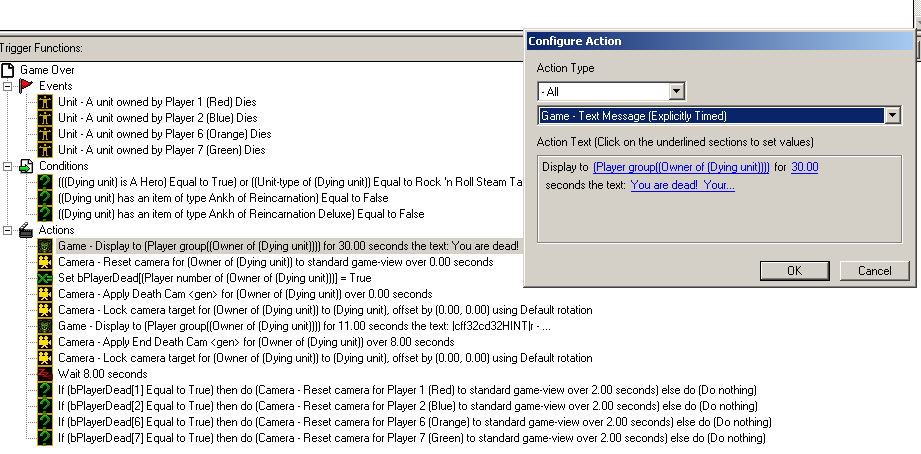Little Coders
Max Ogden
Elementary school programming
My first foray into programming was in 1999 and happened accidentally inside the Starcraft custom level editor. I would sit, fully immersed in a paracosm, and create complex storylines that the player could play through, one small objective at a time. You could specify, for instance, that if a Zergling walks onto a particular platform then an event should trigger. You could subscribe other elements of the game to listen for events on that platform and perform other callbacks. I was getting exposed to event based publish/subscribe asynchronous programming without realizing it.

triggers inside a Starcraft scenario
When my older brother asked me how to get his nine year old interested in programming, I told him to look for a programming environment that sacrifices practicality for imagination. Nine year olds aren't worried about vendor lock in or job security, they are only going to get hooked if the feel like they are playing a video game (in my case with Starcraft I was literally playing a video game). A good example of this mentality is Hackety Hack by _why the lucky stiff. Hackety Hack aims to "offer a place for plainspeople to tinker with code". Here is a wonderful video from the Art && Code Symposium where _why talks about his thoughts on programming education for youngsters and shows off Hackety Hack. Highly recommended viewing.
Near the end of the above video, _why describes a card game called Kaxxt that is designed to get little coders introduced to fundamental programming concepts. At it's core Kaxxt is about robots, lazers and pyramids. What nine year old wouldn't want to play that? When kids play this game they get exposed to ideas such as enumerability or thinking recursively, much in the same fashion that The Little Schemer tries to "present abstract concepts in a humorous and easy-to-grasp fashion". The Flash game Lightbot also comes to mind. In Lightbot, you visually program an animated robot through a series of puzzles. It seems that robots and lazers may be the key to connecting with today's youth.
Sadly, _why mysteriously stopped contributing to his projects at some point in 2009, leaving many orphaned works behind. His projects have been adopted by various open source community members. Steve Klabnik recently quit his job to courageously follow his heart and work on Hackety Hack full time. Similarly, Joey Hess then took the liberty of creating an alpha, playtestable version of Kaxxt that uses the pieces from the board game Icehouse. His port is called 'Kaxxt on Ice'
There are also a few notable academic programming education efforts. Greenfootis designed to teach kids Java. There is an entertaining series of postsfrom a programmer who tried teaching his nine year old daughter how to program using Greenfoot. Google has been lightly researching alternative curriculum designs through their Google for Educators program. As described by Google's director of education relations in the tech talk "Initiatives in Education", Google has been working on "integrating computing curriculum across K-12 core subjects". They also recently donated 2 million USD to Sal Khan's Khan Academy, which offers a staggering amount of free, digestible education lectures.
MIT's Scratch and Carnegie Mellon's Alice seem to each have years of development poured into them, as well as some friendly competitionand actual in-classroom testing. At first glance, both Scratch and Alice appear deep and involved, much like a complicated programming IDE. I would personally like to see more lightweight artistic interpretations, mockups and spikes of the PhD level programming educational research that is happening between Google, MIT, Carnegie Mellon and elsewhere. In the Hackety Hack Manifesto it is explictly stated that"IDEs are a disaster. Newbs should see only one non-scary window free of tree controls and pinned windows and toolbars. As such, we want to stay away from project files and makefiles, the trappings of an IDE."
As part of my fellowship with Code for America in 2011 I will be working with the city of Boston on software to improve public school education (more details here). I am excited at the prospect of getting to meet those working on Scratch at MIT or researchers from the Concord Consortium.